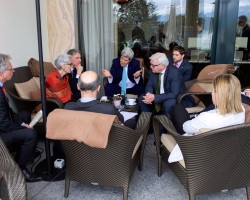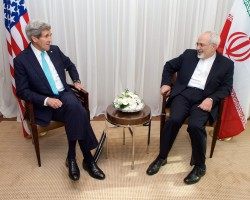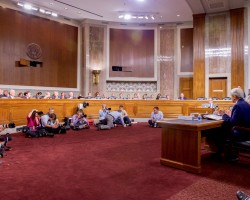Examining Sanctions Against Iran
Targeted sanctions towards Iran have been a cornerstone of the Obama administration’s successful strategy to internationally isolate Iran, along with diplomatic pressure and security cooperation with allies and partners in the region. Last week, a number of high-profile national security and economic experts issued a report exploring the costs and benefits of sanctions. The bipartisan signatories include Amb. James Dobbins, Sen. Chuck Hagel, Rep. Lee Hamilton, Ellen Laipson, Paul Pillar, Vali Nasr, James Walsh, Amb. Daniel Kurtzer, Jessica Matthews, former CIA Director Michael Hayden, Karim Sadjadpour, former Chairman of the Federal Reserve Paul Volcker, former Treasury Secretary Paul O’Neil, and General Anthony Zinni, among others. The analysis finds that sanctions have had a meaningful impact on the regime in Tehran; cautions that they also carry unintended consequences; and highlight the importance of embedding sanctions in a negotiating strategy to achieve a specific goal. As Congress and the administration work to address American concerns regarding Iran, the report offers important lessons about prioritizing efforts to achieve America’s objectives – in Iran and elsewhere sanctions are used.
Sanctions have weakened the regime in Tehran. The report states, “Targeted (or ‘smart’) sanctions have reduced Iran’s ability to acquire material that could be used for a nuclear weapons program and its ability to modernize its armed forces. Recently imposed comprehensive (or “crippling”) sanctions have sent a clear message to Iran’s leadership about the economic cost of continuing to ignore the demands of the United States, the UN Security Council, and others. Sanctions have worked to constrain some Iranian activities as well as to damage Iran’s economy and further isolate Iran from the international community. The test now is whether the sanctions will ultimately work to change Iranian policies and behavior.” The report also highlights sanctions’ use as a basis for coalition building. [Iran Project, 12/6/12]
Sanctions are not cost-free, with “some unintended negative consequences.” The report states, “The decision to make international sanctions a centerpiece of its Iran strategy has had some geopolitical costs for the United States, and fault lines are developing in the alliance, potentially giving Iran some options for offsetting the impacts of the sanctions. Sanctions designed to weaken Iran’s economy and put pressure on Iranian leadership are having some effect, but they also are having some unintended negative consequences.”
The specific negative consequences cited in the report include: disputes with allies and other countries; increased corruption and control of Iran’s economy by unaccountable factions; long-term alienation between the United States and Iranian citizens; increased potential for conflict; potential humanitarian effects; detrimental economic effects on the United States, its European allies, and the region; and detrimental effects on the global energy supply and the stability of the global energy market. [Iran Project, 12/6/12]
“Sanctions alone are not a policy,” but work best as part of a broader negotiating strategy. The report states, “We believe the United States might be better able to gauge and maximize the effectiveness of recent sanctions if the objectives that are most relevant and pressing today could be disentangled from other objectives that have been linked with sanctions. Or, to put this differently: Sanctions alone are not a policy. If resolving the nuclear issue is now the most important objective of the sanctions regime, then sanctions strategies – and the negotiating strategy associated with sanctions – should be assessed in terms of their effectiveness or likely effectiveness in achieving that objective.”
It further states, “the effectiveness of sanctions against Iran will depend not only on the sanctions themselves, but also on the negotiating strategy associated with them.” The authors also note that sanctions’ use in negotiations is dependent on the ability to ease or lift some sanctions as an outcome. [Iran Project, 12/6/12]




